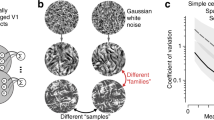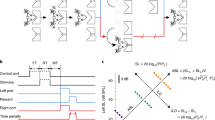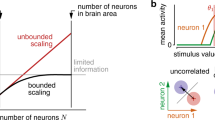Abstract
THE logarithmic law relating sensation and stimulus intensity which was first put forward by Fechner1 has in recent years been seriously challenged: it is claimed that experiment can show directly that the true psychophysical law is a power function2. But if the relation between these alternative laws is examined it appears that, unless special assumptions are made, the choice between them is not empirical, but conventional.
This is a preview of subscription content, access via your institution
Access options
Subscribe to this journal
Receive 51 print issues and online access
$199.00 per year
only $3.90 per issue
Buy this article
- Purchase on Springer Link
- Instant access to full article PDF
Prices may be subject to local taxes which are calculated during checkout
Similar content being viewed by others
References
Fechner, G. T., Elemente der Psychophysik (Leipzig, 1860).
Stevens, S. S., Amer. Scientist, 48, 226 (1960).
Ekman, G., J. Psychol., 45, 287 (1958).
Stevens, S. S., and Davis, H., Hearing (Wiley, New York, 1938).
Treisman, M., Quart. J. Exp. Psychol. (in the press); Brit. J. Phil. Sci. 13, 130 (1962).
Author information
Authors and Affiliations
Rights and permissions
About this article
Cite this article
TREISMAN, M. Laws of Sensory Magnitude. Nature 198, 914–915 (1963). https://doi.org/10.1038/198914a0
Issue Date:
DOI: https://doi.org/10.1038/198914a0
Comments
By submitting a comment you agree to abide by our Terms and Community Guidelines. If you find something abusive or that does not comply with our terms or guidelines please flag it as inappropriate.



